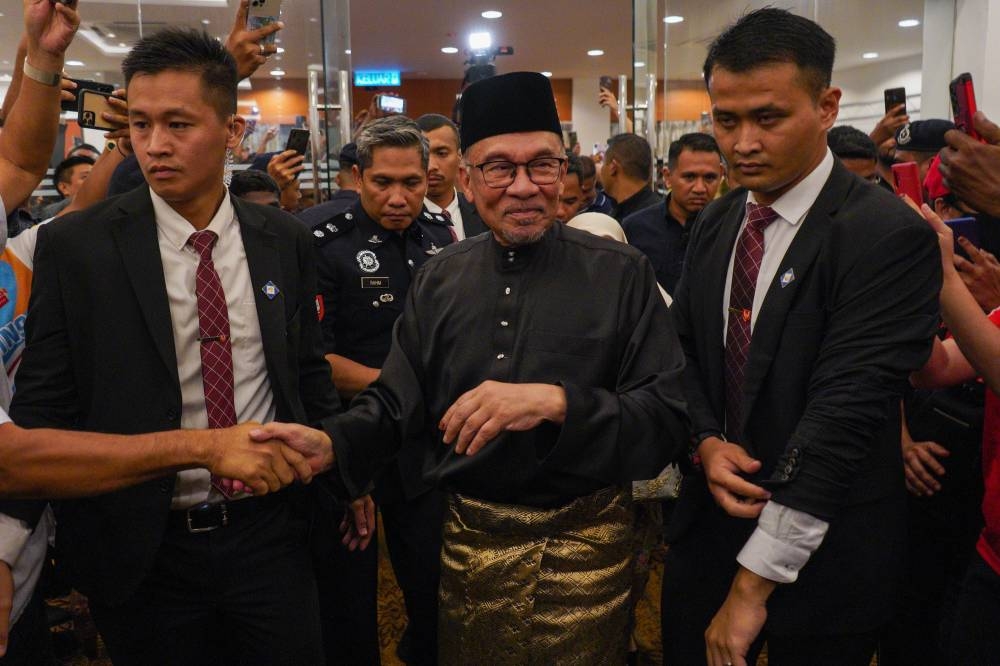KUALA LUMPUR, Nov. 25 — Malaysia’s 10th prime minister Datuk Seri Anwar Ibrahim will have a difficult first task of assembling a Cabinet from his diverse “National Unity” government that would last the full term of the 15th Parliament, said analysts.
With Anwar’s Pakatan Harapan short of the 112 lawmakers needed for the simplest of majorities in the 222-seat Parliament, he has had to enlist both Barisan Nasional and Gabungan Parti Sarawak, both rival coalitions with differing ideologies and even manifestos.
He will need to satisfy them in terms of the quantity and quality of portfolios in return for their support, all while avoiding an inflated Cabinet for which his predecessors had been criticised.
“The Anwar administration needs to do several things in quick succession. First, it will need to name a Cabinet, which will be challenging and require lots of negotiation to ensure that all the various coalition member parties get something.
“In addition, we know that many sensitive Cabinet positions will be closely monitored to see if different communities are represented,” senior fellow and coordinator at the ISEAS-Yusof Ishak Institute Francis Hutchinson told Malay Mail.
Universiti Sains Malaysia political science professor Ahmad Fauzi Abdul Hamid said Anwar’s appointment as prime minister with the support of political rivals was a watershed moment that heralded a new era for Malaysian democracy.
Anwar and a new era
“An epoch of cooperative rather than competitive party politics.
“With the ideological make-up of Malaysians becoming more pluralistic than ever, the days of one political bloc dominating over the rest is being phased out,” he said, adding that the new government must eventually prove itself workable in the long-run.
However, it remains to be seen if Anwar can reel in politicians from BN and Umno, who had just two months ago pushed for the general election to end the political instability besetting three administrations in the span of just four years.
Ahmad Fauzi claimed that these politicians had called for a snap election on the pretence of restoring stability when they had hoped to achieve political dominance with minimal checks and balances.
Senior fellow at the Singapore Institute of International Affairs Oh Ei Sun said it would be premature to predict how Anwar’s government would perform, noting the motley gathering of parties meant conflicting interests were inevitable
“I sincerely don’t know how long this government can last because such a unity government of grand coalition will include political parties of diverse ideologies, and if the last two years or four years have given any hint, they are likely to scheme against each other,” Oh said.
He added that the first order of business for the new government was to expedite the passage of a Budget 2023, as Parliament was dissolved before the one tabled by Barisan Nasional could be approved.
Echoing Oh’s sentiment, political analyst Ahmad Atory Hussain said that the stability of the new government and Anwar’s prime ministership will remain under doubt at least until Umno’s internal election, which is scheduled to take place next month.
He said Anwar’s prime ministership hinged on Umno president and BN chairman Datuk Seri Ahmad Zahid Hamidi, who is facing immense pressure from some party leaders to step down following a dismal showing in the polls.
Prior to Anwar’s swearing-in, 10 BN MPs had pledged their allegiance to Tan Sri Muhyiddin Yassin who was the prime minister candidate for Perikatan Nasional, the second largest coalition after PH by number.
BN, which had pushed for national polls to be held this year ahead of the GE14 expiry next year, only garnered 30 seats.
However, it appears that Ahmad Zahid intends to stay on despite the calls for him to resign, as he still retains strong grassroots support within the party.
Some were more generous with their assessment prime minister
With University Technology Malaysia (UTM) senior lecturer Mazlan Ali saying Anwar’s standing as prime minister and that of his government will grow over time as this was what the Yang di-Pertuan Agong had suggested to resolve the post-election impasse.
As for whether the new government is comparable to the grand coalition of BN that was formed in the aftermath of the 1969 general election and the May 13 riots, Hutchinson disagreed with the view.
“I think that this is part of a process that began – not in 1974 – but in 1999, when BN began to receive narrower parliamentary majorities. Barring 2004 when Pak Lah ran for the first time and BN enjoyed a bump in support, it has been downward since then.
“Now we have a context where BN is a normal coalition like anyone else,” he said, using the nickname of Malaysia’s fifth prime minister Tun Abdullah Ahmad Badawi.
Almost three decades in the making, Anwar’s appointment was finalised after the Yang di-Pertuan Agong and the Conference of Rulers convened a special meeting at Istana Negara yesterday over the deadlock.
Shortly after the meeting, Istana Negara said the Agong had consented to appoint Anwar as the prime minister.
Saturday’s election left Anwar’s PH coalition with the most seats in Parliament, but not enough for a simple majority by itself.
For any query with respect to this article or any other content requirement, please contact Editor at [email protected] 2017 Malay Mail Online

